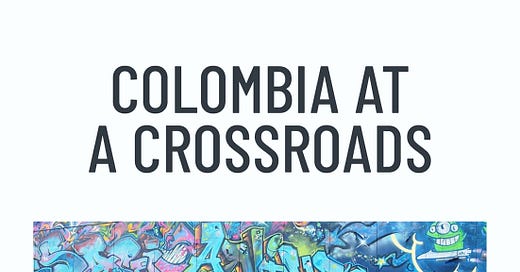Taking Colombia’s pulse
A new introduction to the country offers an honest assessment of its challenges. Review: Colombia at a Crossroads, Richard McColl, by Gavin O'Toole
Colombia at a Crossroads: A Historical and Social Biography, Richard McColl, 2024, Fuller Vigil
Listen to what Colombians have to say about the conditions in which they live and then you can form your own opinion.
Author Richard McColl practises what he preaches in this effort to take the pulse of a society whose spell he has clearly fallen under in a country he has made his home since 2007.
His fascination is evident on every page of Colombia at a Crossroads, an unusual and sometimes eclectic set of snapshots of a people who wear their rapid social transition on their sleeve.
It is, the author insists, neither guide book, nor a travelogue, more “a summary of Colombia, something with a pulse”, and there is much to be said for this vernacular approach.
There are two forms of writing about Latin America—scholastic high-brow as impenetrable as the jungles of Darién, and tiresome table-thumping, the weary polemics of left and right that are used to score points or lure chicks at parties.
What is sorely needed is a popular, accessible yet eloquent portal to a highly complex but multicoloured reality—and this book is a good first step.
Given the rapid shifts that have been reshaping Colombian politics and culture in the last decade or so, McColl has set himself the task of offering a realistic, if sympathetic, introduction.
To its great credit and true to his initial advice, it has its ear to the ground, its insights and reflections grounded in the experiences he has gained as a foreign correspondent, consultant and publisher in his chosen land.
He begins with the new era, the transformational government of Gustavo Petro, “the last South American guerrilla” and Colombia’s first leftwing president.
McColl’s assessment of both the huge challenges faced by Petro in delivering on his promise to bring “tranquillity and peace” at last, and the outlook of a man forged in the heat of armed struggle unlike many “Pink Tide” or new left incumbents, is nuanced and informed.
As the right digs in, the author asks the uncomfortable question that should probably be on everybody’s tongues: “Dare we suggest it, but could Petro have come too late?”
His profile of the new president’s background and record in office, not least as mayor of Bogotá, is refreshingly balanced. McColl should know, he interviewed Petro in 2013 to explore the substance behind his mantra of “Bogotá Humana”.
He gives the president the benefit of the doubt and the positives their due, while accepting that “the bar is set remarkably low when it comes to politicians in Colombia”. The danger facing Petro in a country that has become accustomed to conflict, of course, is that peace and stability are insufficient in themselves to deliver meaningful change.
At the end of the day, McColl notes, “he ruffled some feathers and recognized the poor. Hardly perfect, but certainly not a lame duck that he is often made out to be.”
He adds: “Drawing a line beneath 16 months completed of Gustavo Petro’s mandate – as we do here – reveals little and at the same time a great deal. The accusations of corruption, the political scandals, Petro’s unexplained absences from meetings and obligations, the accusations, by his brother that the president suffers from Aspergers continue to mount. But, were we to fall into the inevitable trap of ‘whataboutism,’ couldn’t we say that this is just normal governing in Colombia, and for once citizens of this country don’t think their government is trying to kill them?”
As Trump again stalks the White House, it is the section on Petro and relations with the US that will be of interest to many readers.
McColl is right to warn about the threat posed by the re-election to the White House of a right-wing populist with nothing but disregard for Latin America.
Colombia’s president has adopted a gradualist, realistic policy to court Nicolás Maduro in Venezuela—the countries are neighbours, after all—a delicate undertaking given the latter’s strategic importance to Petro’s ambition of achieving “total peace” with the FARC and ELN.
Unravelling the many layers of a conundrum that combines US imperial hostility to Venezuela and Cuba, wider ambitions for regional stability, the ill-conceived “war on drugs” and the pressing need to resolve Colombia’s own, deep tensions, this is a potential minefield in relations with Washington that could be disrupted at any moment by an ignorant new incumbent in the Oval Office.
Frankly, one pities the gargantuan task facing Petro—even if his own people as McColl notes are becoming disillusioned with him.
There is something very Colombian about this book, which dances between themes with rhythmic ease, pulls no punches, yet begs not to offend.
It is honest and unpretentious, written from the perspective of a journalist who cares about giving the reader a truthful understanding of this multifaceted country.
If you are about to travel there, or have developed an interest in it, you would do well to start by picking up a copy of Colombia at a Crossroads.



